Unit 8 A green world - grammar 知识点讲义 2023-2024学年牛津译林版八年级英语下册
文档属性
| 名称 | Unit 8 A green world - grammar 知识点讲义 2023-2024学年牛津译林版八年级英语下册 |
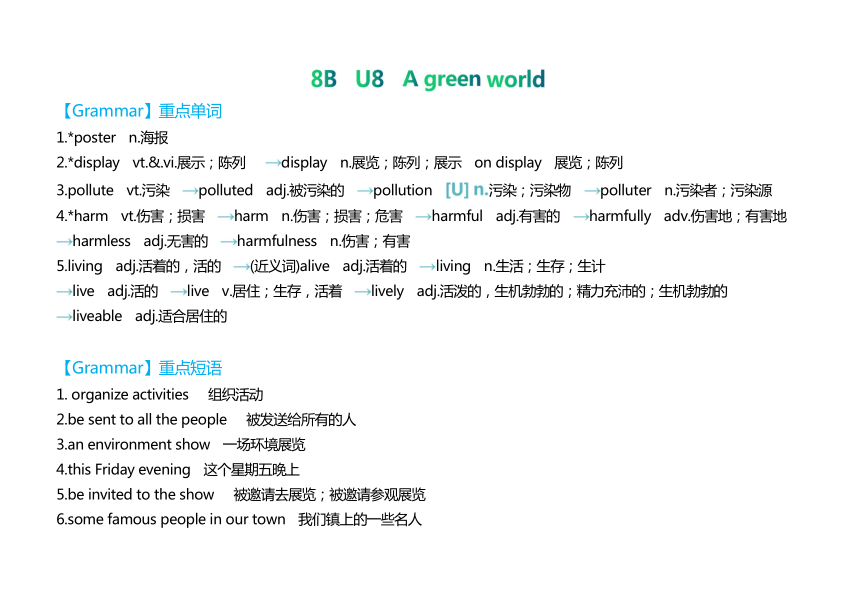
|
|
| 格式 | docx | ||
| 文件大小 | 29.3KB | ||
| 资源类型 | 教案 | ||
| 版本资源 | 牛津译林版 | ||
| 科目 | 英语 | ||
| 更新时间 | 2024-06-11 00:00:00 | ||
图片预览

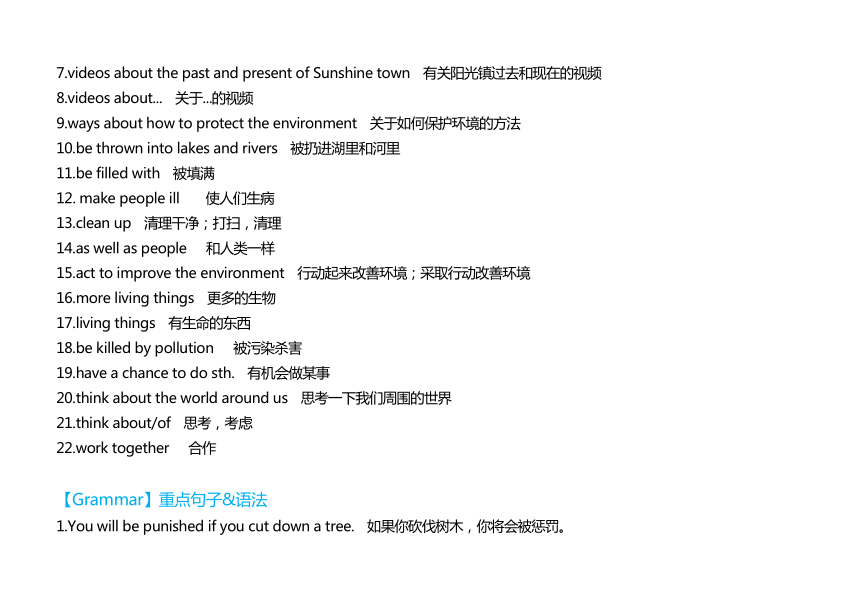
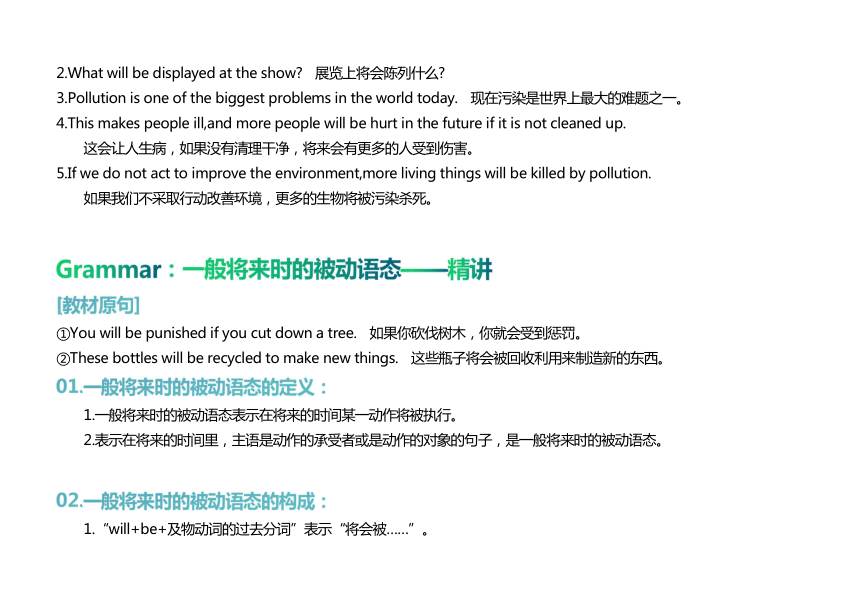
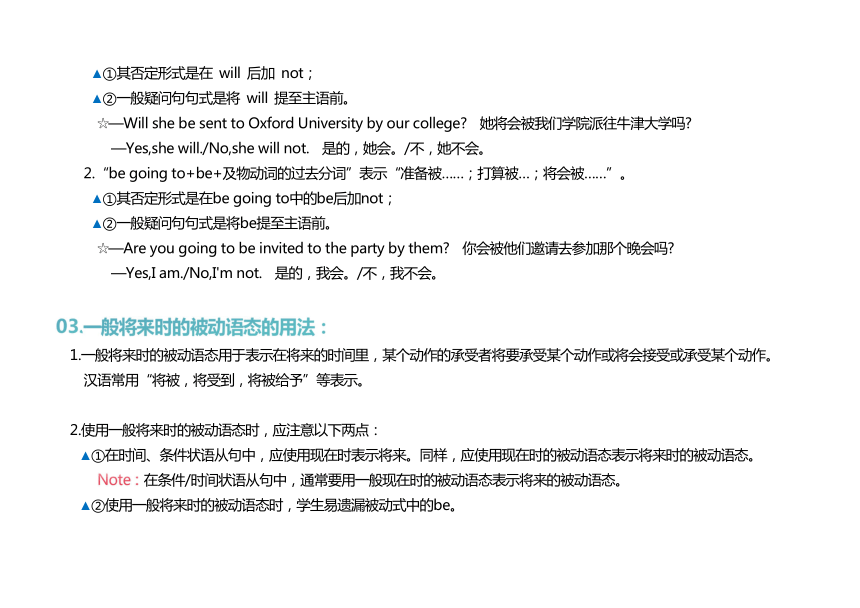
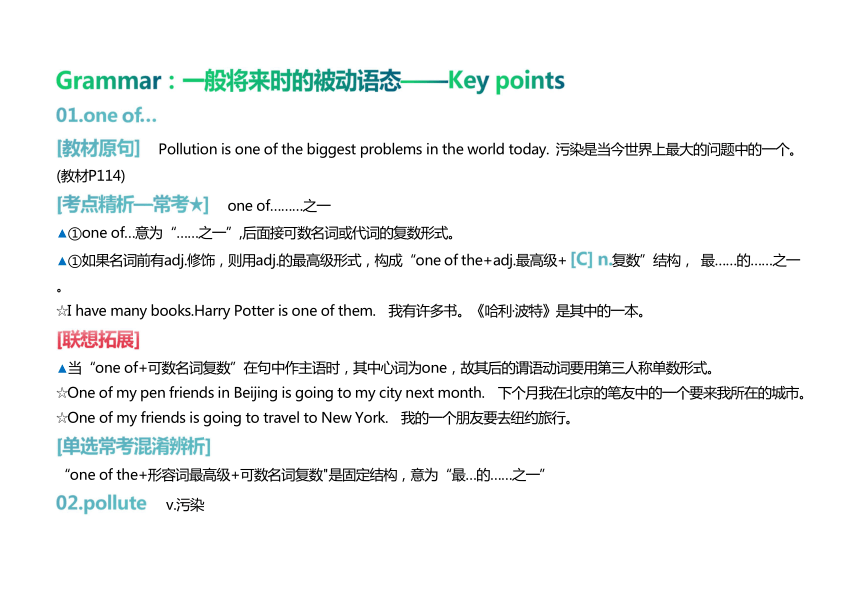
文档简介
8B U8 A green world
【Grammar】重点单词
1.*poster n.海报
2.*display vt.&.vi.展示;陈列 →display n.展览;陈列;展示 on display 展览;陈列
3.pollute vt.污染 →polluted adj.被污染的 →pollution [U] n.污染;污染物 →polluter n.污染者;污染源
4.*harm vt.伤害;损害 →harm n.伤害;损害;危害 →harmful adj.有害的 →harmfully adv.伤害地;有害地
→harmless adj.无害的 →harmfulness n.伤害;有害
5.living adj.活着的,活的 →(近义词)alive adj.活着的 →living n.生活;生存;生计
→live adj.活的 →live v.居住;生存,活着 →lively adj.活泼的,生机勃勃的;精力充沛的;生机勃勃的
→liveable adj.适合居住的
【Grammar】重点短语
1. organize activities 组织活动
2.be sent to all the people 被发送给所有的人
3.an environment show 一场环境展览
4.this Friday evening 这个星期五晚上
5.be invited to the show 被邀请去展览;被邀请参观展览
6.some famous people in our town 我们镇上的一些名人
7.videos about the past and present of Sunshine town 有关阳光镇过去和现在的视频
8.videos about... 关于...的视频
9.ways about how to protect the environment 关于如何保护环境的方法
10.be thrown into lakes and rivers 被扔进湖里和河里
11.be filled with 被填满
12. make people ill 使人们生病
13.clean up 清理干净;打扫,清理
14.as well as people 和人类一样
15.act to improve the environment 行动起来改善环境;采取行动改善环境
16.more living things 更多的生物
17.living things 有生命的东西
18.be killed by pollution 被污染杀害
19.have a chance to do sth. 有机会做某事
20.think about the world around us 思考一下我们周围的世界
21.think about/of 思考,考虑
22.work together 合作
【Grammar】重点句子&语法
1.You will be punished if you cut down a tree. 如果你砍伐树木,你将会被惩罚。
2.What will be displayed at the show 展览上将会陈列什么
3.Pollution is one of the biggest problems in the world today. 现在污染是世界上最大的难题之一。
4.This makes people ill,and more people will be hurt in the future if it is not cleaned up.
这会让人生病,如果没有清理干净,将来会有更多的人受到伤害。
5.If we do not act to improve the environment,more living things will be killed by pollution.
如果我们不采取行动改善环境,更多的生物将被污染杀死。
Grammar:一般将来时的被动语态——精讲
[教材原句]
①You will be punished if you cut down a tree. 如果你砍伐树木,你就会受到惩罚。
②These bottles will be recycled to make new things. 这些瓶子将会被回收利用来制造新的东西。
01.一般将来时的被动语态的定义:
1.一般将来时的被动语态表示在将来的时间某一动作将被执行。
2.表示在将来的时间里,主语是动作的承受者或是动作的对象的句子,是一般将来时的被动语态。
02.一般将来时的被动语态的构成:
1.“will+be+及物动词的过去分词”表示“将会被……”。
▲①其否定形式是在 will 后加 not;
▲②一般疑问句句式是将 will 提至主语前。
☆—Will she be sent to Oxford University by our college 她将会被我们学院派往牛津大学吗
—Yes,she will./No,she will not. 是的,她会。/不,她不会。
2.“be going to+be+及物动词的过去分词”表示“准备被……;打算被…;将会被……”。
▲①其否定形式是在be going to中的be后加not;
▲②一般疑问句句式是将be提至主语前。
☆—Are you going to be invited to the party by them 你会被他们邀请去参加那个晚会吗
—Yes,I am./No,I'm not. 是的,我会。/不,我不会。
03.一般将来时的被动语态的用法:
1.一般将来时的被动语态用于表示在将来的时间里,某个动作的承受者将要承受某个动作或将会接受或承受某个动作。
汉语常用“将被,将受到,将被给予”等表示。
2.使用一般将来时的被动语态时,应注意以下两点:
▲①在时间、条件状语从句中,应使用现在时表示将来。同样,应使用现在时的被动语态表示将来时的被动语态。
Note:在条件/时间状语从句中,通常要用一般现在时的被动语态表示将来的被动语态。
▲②使用一般将来时的被动语态时,学生易遗漏被动式中的be。
Grammar:一般将来时的被动语态——Key points
01.one of…
[教材原句] Pollution is one of the biggest problems in the world today. 污染是当今世界上最大的问题中的一个。 (教材P114)
[考点精析—常考★] one of………之一
▲①one of…意为“……之一”,后面接可数名词或代词的复数形式。
▲①如果名词前有adj.修饰,则用adj.的最高级形式,构成“one of the+adj.最高级+ [C] n.复数”结构, 最……的……之一 。
☆I have many books.Harry Potter is one of them. 我有许多书。《哈利·波特》是其中的一本。
[联想拓展]
▲当“one of+可数名词复数”在句中作主语时,其中心词为one,故其后的谓语动词要用第三人称单数形式。
☆One of my pen friends in Beijing is going to my city next month. 下个月我在北京的笔友中的一个要来我所在的城市。
☆One of my friends is going to travel to New York. 我的一个朋友要去纽约旅行。
[单选常考混淆辨析]
“one of the+形容词最高级+可数名词复数"是固定结构,意为“最…的……之一”
02.pollute v.污染
[教材原句] …so many of them are polluted.…… 因此,它们中很多都被污染了。
[考点精析] pollute vt.污染 →polluted adj.被污染的 →pollution [U] n.污染;污染物 →polluter n.污染者;污染源
☆We should not pollute our rivers with waste. 我们不应该用废弃物污染我们的河流。
☆Water pollution kills our fish. 水污染杀死了我们的鱼。
☆The polluted water and air are harmful to people's health. 被污染了的水和空气对人们的健康有害。
03.as well as
[教材原句] As well as people,animals are harmed by pollution. 除了人之外,动物也会被污染物所危害。 (教材P114)
[考点精析—常考★] as well as 也;还;除……之外(也)
▲①as well as是固定词组,常用来连接两个并列的成分,它强调的是前一项,后一项只是被顺便提及。
▲②当as well as连接并列的主语时,谓语动词应与前一个主语在人称和数上保持一致。
☆Tina as well as her parents wants to go to the movies. 蒂娜和她的父母都想去看电影。
[单选常考混淆辨析]
A.as well as 也 B.as long as 只要 C.as good as 像……一样好 D.as soon as 一……就
[单选常考混淆辨析]
A.as well as 而且;还 B.after all 毕竟 C.above all 首先 D.as a result 结果
[联想拓展][中考考点] 主谓一致“就远原则”:
“就远原则”:谓语动词的单复数形式取决于离它最远的主语。
1个“包括”:including;4个“和”:as well as,with,together with,along with;
1个“不是”:rather than;5个“除”:but,except,besides,in addition to,apart from。
[联想拓展][中考考点] 主谓一致“就近原则”:
“就近原则”:谓语动词的单复数形式取决于离它最近的主语。
1.there be 结构:某地有某物;
2.both... and... 两者都...... :连接并列主语,谓语动词用复数;
3.not only…but also…不仅……,而且……;
4.not…but … 不是……而是……;
5.either...or... 或者......或者...... ;要么……要么……
6.neither... nor... 既不.....也不......;
7.whether...or...
8....or...
[联想拓展] as well as与 not only ...but also... 都有"不但.....而且......"的意思,但两者稍有区别:
易混词汇 含义及用法
A as well as B 强调的是A,连接两个主语时,谓语动词与A保持一致。
not only A but also B 强调的是B,当连接两个主语时,谓语动词与B保持一致。
04.harm v.伤害;损害
[教材原句] As well as people,animals are harmed by pollution. 除了人之外,动物也会被污染物所危害。 (教材P114)
[考点精析] harm vt.伤害;损害 →harm n.伤害;损害;危害 →harmful adj.有害的 →harmfully adv.伤害地;有害地
→harmless adj.无害的 →harmfulness n.伤害;有害
◆do harm to… 伤害……
◆be harmful/harmless to… 对……有害/无害
◆be harmful to…= be bad for… 对……有害
☆We may use many facts to prove smoking harms human body health. 我们可以用很多事实来证明吸烟危害人体健康。
☆Air pollution has done much harm to our health. 空气污染已经给我们的健康造成了很大的伤害。
☆Noise is a kind of pollution and it is harmful to our ears. 噪声是一种污染,它对我们的听力有害。
[常考辨析] wound [9A U8 reading ] ,hurt 和 harm
易混词汇 含义 用法 常考短语
wound 使……受伤 指刀伤、枪伤或刺伤等皮肉之伤,常指战场上受的伤。 ◆be wounded with sth. 被……所伤
hurt 使受伤,伤害 指身体上或精神上的伤害。 ◆sb. be badly hurt in the car accident 在车祸中伤得很重
harm 1.身体上或精神上的伤害均可,有时可指引起不安或不便,还可用于抽象事物,尤其是指不道德的事情。
2.→harmful adj.有害的 ◆be harmful to... 对.....有害
[复习回顾—hurt—7B U7 reading ]
[教材原句] Her left leg was badly hurt and she could not get out. 她的左腿严重受伤,不能出去。
[考点精析] hurt◆ adj.受伤的 →hurt vt.&vi. 使受伤;伤害,使不快;疼痛 →(过去式/过去分词)hurt
◆get hurt 受伤 ◆be hurt 受伤 ◆be badly hurt 严重受伤
◆hurt oneself 伤着自己 ◆hurt sb. 伤害某人 ◆hurt one’s + 身体部位 伤害到了某人的身体部位
[拓展提升—wound—9A U8 reading ]
[教材原句] The victim was wounded with a knife and bled to death as a result. 受害者被人用刀刺伤,结果失血过多而死。
[考点精析] wound vt.使…受伤 →(过去式/过去分词)wounded n.伤口;创伤 →adj. wounded 受伤的
▲wound vt.使…受伤,指用刀或枪等伤害某人,句中用了被动语态
◆sb. be wounded in the arm 某人的手臂受伤了
◆the wounded 伤员
◆be wounded with sth. 被……所伤
◆be wounded with a knife 受刀伤
[联想拓展] wound n. 伤口;创伤,尤指身体遭受刀、子弹等伤害留下的伤口、创伤。
☆The hunter wounded a deer. 猎人打伤了一只鹿。
☆He was wounded with a gun. 他受了枪伤。
05.living adj.活着的,活的
[教材原句] If we do not act to improve the environment,more living things killed by pollution.
如果我们不采取行动改善环境,更多的生物将被污染杀死。
[考点精析] living adj.活着的,活的 →(近义词)alive adj.活着的 →living n.生活;生存;生计
→live adj.活的 →live v.居住;生存,活着 →lively adj.活泼的,生机勃勃的;精力充沛的;生机勃勃的
→liveable adj.适合居住的
▲①living意为“活着的”,强调“尚在人间的,健在的”,可作定语或表语,用来指人或物。
▲②living无比较级和最高级形式。
[常考辨析] lively,alive,living 与 live
易混词汇 词性及含义 用法及常考搭配
lively adj.生动的,活泼的,充满生气的 作表语或定语,用来修饰人或物。
alive adj.活着的,在世的 常用作表语或后置定语,用来修饰人或物。
living adj.活着的,活的 作定语,常放在名词的前面,有时也可放在名词的后面。
live adj.活的;现场直播的 通常位于表物的名词前。
☆The blue whale is the largest living animal in the world. 蓝鲸是世界上活着的最大的动物。
☆The boy has a lively mind. 这个男孩头脑灵活。
☆Is the cat still alive 那只猫还活着吗
☆We saw a real live snake. 我们看见了一条活生生的蛇。
【Grammar】重点单词
1.*poster n.海报
2.*display vt.&.vi.展示;陈列 →display n.展览;陈列;展示 on display 展览;陈列
3.pollute vt.污染 →polluted adj.被污染的 →pollution [U] n.污染;污染物 →polluter n.污染者;污染源
4.*harm vt.伤害;损害 →harm n.伤害;损害;危害 →harmful adj.有害的 →harmfully adv.伤害地;有害地
→harmless adj.无害的 →harmfulness n.伤害;有害
5.living adj.活着的,活的 →(近义词)alive adj.活着的 →living n.生活;生存;生计
→live adj.活的 →live v.居住;生存,活着 →lively adj.活泼的,生机勃勃的;精力充沛的;生机勃勃的
→liveable adj.适合居住的
【Grammar】重点短语
1. organize activities 组织活动
2.be sent to all the people 被发送给所有的人
3.an environment show 一场环境展览
4.this Friday evening 这个星期五晚上
5.be invited to the show 被邀请去展览;被邀请参观展览
6.some famous people in our town 我们镇上的一些名人
7.videos about the past and present of Sunshine town 有关阳光镇过去和现在的视频
8.videos about... 关于...的视频
9.ways about how to protect the environment 关于如何保护环境的方法
10.be thrown into lakes and rivers 被扔进湖里和河里
11.be filled with 被填满
12. make people ill 使人们生病
13.clean up 清理干净;打扫,清理
14.as well as people 和人类一样
15.act to improve the environment 行动起来改善环境;采取行动改善环境
16.more living things 更多的生物
17.living things 有生命的东西
18.be killed by pollution 被污染杀害
19.have a chance to do sth. 有机会做某事
20.think about the world around us 思考一下我们周围的世界
21.think about/of 思考,考虑
22.work together 合作
【Grammar】重点句子&语法
1.You will be punished if you cut down a tree. 如果你砍伐树木,你将会被惩罚。
2.What will be displayed at the show 展览上将会陈列什么
3.Pollution is one of the biggest problems in the world today. 现在污染是世界上最大的难题之一。
4.This makes people ill,and more people will be hurt in the future if it is not cleaned up.
这会让人生病,如果没有清理干净,将来会有更多的人受到伤害。
5.If we do not act to improve the environment,more living things will be killed by pollution.
如果我们不采取行动改善环境,更多的生物将被污染杀死。
Grammar:一般将来时的被动语态——精讲
[教材原句]
①You will be punished if you cut down a tree. 如果你砍伐树木,你就会受到惩罚。
②These bottles will be recycled to make new things. 这些瓶子将会被回收利用来制造新的东西。
01.一般将来时的被动语态的定义:
1.一般将来时的被动语态表示在将来的时间某一动作将被执行。
2.表示在将来的时间里,主语是动作的承受者或是动作的对象的句子,是一般将来时的被动语态。
02.一般将来时的被动语态的构成:
1.“will+be+及物动词的过去分词”表示“将会被……”。
▲①其否定形式是在 will 后加 not;
▲②一般疑问句句式是将 will 提至主语前。
☆—Will she be sent to Oxford University by our college 她将会被我们学院派往牛津大学吗
—Yes,she will./No,she will not. 是的,她会。/不,她不会。
2.“be going to+be+及物动词的过去分词”表示“准备被……;打算被…;将会被……”。
▲①其否定形式是在be going to中的be后加not;
▲②一般疑问句句式是将be提至主语前。
☆—Are you going to be invited to the party by them 你会被他们邀请去参加那个晚会吗
—Yes,I am./No,I'm not. 是的,我会。/不,我不会。
03.一般将来时的被动语态的用法:
1.一般将来时的被动语态用于表示在将来的时间里,某个动作的承受者将要承受某个动作或将会接受或承受某个动作。
汉语常用“将被,将受到,将被给予”等表示。
2.使用一般将来时的被动语态时,应注意以下两点:
▲①在时间、条件状语从句中,应使用现在时表示将来。同样,应使用现在时的被动语态表示将来时的被动语态。
Note:在条件/时间状语从句中,通常要用一般现在时的被动语态表示将来的被动语态。
▲②使用一般将来时的被动语态时,学生易遗漏被动式中的be。
Grammar:一般将来时的被动语态——Key points
01.one of…
[教材原句] Pollution is one of the biggest problems in the world today. 污染是当今世界上最大的问题中的一个。 (教材P114)
[考点精析—常考★] one of………之一
▲①one of…意为“……之一”,后面接可数名词或代词的复数形式。
▲①如果名词前有adj.修饰,则用adj.的最高级形式,构成“one of the+adj.最高级+ [C] n.复数”结构, 最……的……之一 。
☆I have many books.Harry Potter is one of them. 我有许多书。《哈利·波特》是其中的一本。
[联想拓展]
▲当“one of+可数名词复数”在句中作主语时,其中心词为one,故其后的谓语动词要用第三人称单数形式。
☆One of my pen friends in Beijing is going to my city next month. 下个月我在北京的笔友中的一个要来我所在的城市。
☆One of my friends is going to travel to New York. 我的一个朋友要去纽约旅行。
[单选常考混淆辨析]
“one of the+形容词最高级+可数名词复数"是固定结构,意为“最…的……之一”
02.pollute v.污染
[教材原句] …so many of them are polluted.…… 因此,它们中很多都被污染了。
[考点精析] pollute vt.污染 →polluted adj.被污染的 →pollution [U] n.污染;污染物 →polluter n.污染者;污染源
☆We should not pollute our rivers with waste. 我们不应该用废弃物污染我们的河流。
☆Water pollution kills our fish. 水污染杀死了我们的鱼。
☆The polluted water and air are harmful to people's health. 被污染了的水和空气对人们的健康有害。
03.as well as
[教材原句] As well as people,animals are harmed by pollution. 除了人之外,动物也会被污染物所危害。 (教材P114)
[考点精析—常考★] as well as 也;还;除……之外(也)
▲①as well as是固定词组,常用来连接两个并列的成分,它强调的是前一项,后一项只是被顺便提及。
▲②当as well as连接并列的主语时,谓语动词应与前一个主语在人称和数上保持一致。
☆Tina as well as her parents wants to go to the movies. 蒂娜和她的父母都想去看电影。
[单选常考混淆辨析]
A.as well as 也 B.as long as 只要 C.as good as 像……一样好 D.as soon as 一……就
[单选常考混淆辨析]
A.as well as 而且;还 B.after all 毕竟 C.above all 首先 D.as a result 结果
[联想拓展][中考考点] 主谓一致“就远原则”:
“就远原则”:谓语动词的单复数形式取决于离它最远的主语。
1个“包括”:including;4个“和”:as well as,with,together with,along with;
1个“不是”:rather than;5个“除”:but,except,besides,in addition to,apart from。
[联想拓展][中考考点] 主谓一致“就近原则”:
“就近原则”:谓语动词的单复数形式取决于离它最近的主语。
1.there be 结构:某地有某物;
2.both... and... 两者都...... :连接并列主语,谓语动词用复数;
3.not only…but also…不仅……,而且……;
4.not…but … 不是……而是……;
5.either...or... 或者......或者...... ;要么……要么……
6.neither... nor... 既不.....也不......;
7.whether...or...
8....or...
[联想拓展] as well as与 not only ...but also... 都有"不但.....而且......"的意思,但两者稍有区别:
易混词汇 含义及用法
A as well as B 强调的是A,连接两个主语时,谓语动词与A保持一致。
not only A but also B 强调的是B,当连接两个主语时,谓语动词与B保持一致。
04.harm v.伤害;损害
[教材原句] As well as people,animals are harmed by pollution. 除了人之外,动物也会被污染物所危害。 (教材P114)
[考点精析] harm vt.伤害;损害 →harm n.伤害;损害;危害 →harmful adj.有害的 →harmfully adv.伤害地;有害地
→harmless adj.无害的 →harmfulness n.伤害;有害
◆do harm to… 伤害……
◆be harmful/harmless to… 对……有害/无害
◆be harmful to…= be bad for… 对……有害
☆We may use many facts to prove smoking harms human body health. 我们可以用很多事实来证明吸烟危害人体健康。
☆Air pollution has done much harm to our health. 空气污染已经给我们的健康造成了很大的伤害。
☆Noise is a kind of pollution and it is harmful to our ears. 噪声是一种污染,它对我们的听力有害。
[常考辨析] wound [9A U8 reading ] ,hurt 和 harm
易混词汇 含义 用法 常考短语
wound 使……受伤 指刀伤、枪伤或刺伤等皮肉之伤,常指战场上受的伤。 ◆be wounded with sth. 被……所伤
hurt 使受伤,伤害 指身体上或精神上的伤害。 ◆sb. be badly hurt in the car accident 在车祸中伤得很重
harm 1.身体上或精神上的伤害均可,有时可指引起不安或不便,还可用于抽象事物,尤其是指不道德的事情。
2.→harmful adj.有害的 ◆be harmful to... 对.....有害
[复习回顾—hurt—7B U7 reading ]
[教材原句] Her left leg was badly hurt and she could not get out. 她的左腿严重受伤,不能出去。
[考点精析] hurt◆ adj.受伤的 →hurt vt.&vi. 使受伤;伤害,使不快;疼痛 →(过去式/过去分词)hurt
◆get hurt 受伤 ◆be hurt 受伤 ◆be badly hurt 严重受伤
◆hurt oneself 伤着自己 ◆hurt sb. 伤害某人 ◆hurt one’s + 身体部位 伤害到了某人的身体部位
[拓展提升—wound—9A U8 reading ]
[教材原句] The victim was wounded with a knife and bled to death as a result. 受害者被人用刀刺伤,结果失血过多而死。
[考点精析] wound vt.使…受伤 →(过去式/过去分词)wounded n.伤口;创伤 →adj. wounded 受伤的
▲wound vt.使…受伤,指用刀或枪等伤害某人,句中用了被动语态
◆sb. be wounded in the arm 某人的手臂受伤了
◆the wounded 伤员
◆be wounded with sth. 被……所伤
◆be wounded with a knife 受刀伤
[联想拓展] wound n. 伤口;创伤,尤指身体遭受刀、子弹等伤害留下的伤口、创伤。
☆The hunter wounded a deer. 猎人打伤了一只鹿。
☆He was wounded with a gun. 他受了枪伤。
05.living adj.活着的,活的
[教材原句] If we do not act to improve the environment,more living things killed by pollution.
如果我们不采取行动改善环境,更多的生物将被污染杀死。
[考点精析] living adj.活着的,活的 →(近义词)alive adj.活着的 →living n.生活;生存;生计
→live adj.活的 →live v.居住;生存,活着 →lively adj.活泼的,生机勃勃的;精力充沛的;生机勃勃的
→liveable adj.适合居住的
▲①living意为“活着的”,强调“尚在人间的,健在的”,可作定语或表语,用来指人或物。
▲②living无比较级和最高级形式。
[常考辨析] lively,alive,living 与 live
易混词汇 词性及含义 用法及常考搭配
lively adj.生动的,活泼的,充满生气的 作表语或定语,用来修饰人或物。
alive adj.活着的,在世的 常用作表语或后置定语,用来修饰人或物。
living adj.活着的,活的 作定语,常放在名词的前面,有时也可放在名词的后面。
live adj.活的;现场直播的 通常位于表物的名词前。
☆The blue whale is the largest living animal in the world. 蓝鲸是世界上活着的最大的动物。
☆The boy has a lively mind. 这个男孩头脑灵活。
☆Is the cat still alive 那只猫还活着吗
☆We saw a real live snake. 我们看见了一条活生生的蛇。
